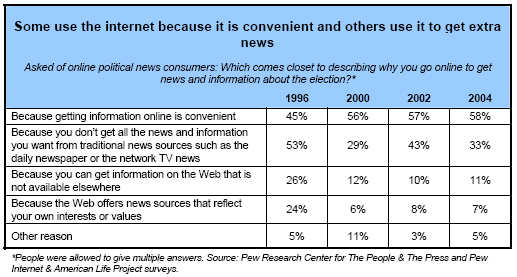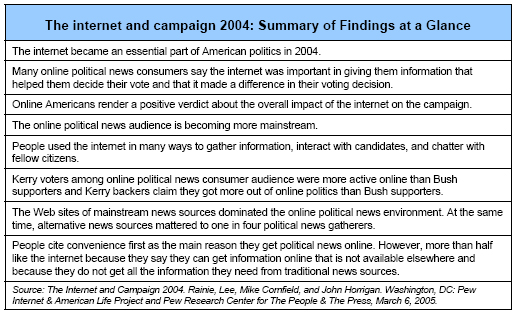The internet was a key force in politics last year as 75 million Americans used it to get news, discuss candidates in emails, and participate directly in the political process.
The internet became an essential part of American politics in 2004.
Last year was a breakout year for the role of the internet in politics. Fully 75 million Americans – 37% of the adult population and 61% of online Americans – used the internet to get political news and information, discuss candidates and debate issues in emails, or participate directly in the political process by volunteering or giving contributions to candidates. The online political news consumer population grew dramatically from previous election years (up from 18% of the U.S. population in 2000 to 29% in 2004), and there was an increase of more than 50% between 2000 and 2004 in the number of registered voters who cited the internet as one of their primary sources of news about the presidential campaign.

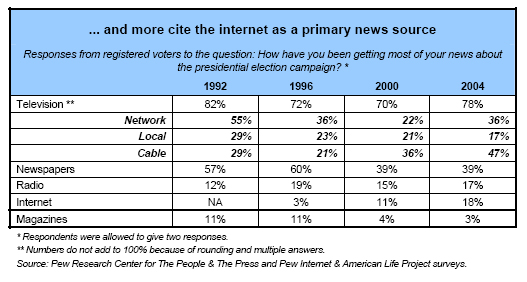
For online Americans, the internet is now a more important source of campaign news and information than radio: 28% of internet users cited the internet as a prime source of campaign news compared to 17% of them who cited radio. For those with broadband at home (a group comprising 27% of the overall U.S. population) the internet rivals newspapers as a major source of campaign news and information: 38% of those with broadband at home cited the internet as a major source of political news, compared to 36% of them who cited newspapers.
For campaign 2004, the overall figures related to uses of the internet for politics were:
- 52% of internet users, or about 63 million people, said they went online to get news or information about the 2004 elections. Throughout this report, we will call this group of people online political news consumers and we will compare them to those who in previous elections said they used the internet to get political news and information about that election.
- 35% of internet users, or about 43 million people, said they used email to discuss politics.
- 11% of internet users, or more than 13 million people, went online to engage directly in campaign activities such as donating money, volunteering, or learning about political events to attend.
Any internet user who said “yes” to one of those three questions is considered part of the online politics user community in our calculations. That came to 61% of internet users, or 75 million people. In fact, many people said “yes” to two or all three of the questions.
Many online political news consumers say the internet was important in giving them information that helped them decide their vote and that it made a difference in their voting decision.
- 52% of political news consumers said the internet was important in giving them information that helped them decide how to vote.
- 27% of them said the political information they got online made them decide to vote for or against a particular candidate.
- 23% said their use of the internet for political news and activities encouraged them to vote.
Online Americans render a positive verdict about the overall impact of the internet on the campaign.
- 49% of all internet users (and 56% of those who get political news online) said “the internet has raised the overall quality of public debate” during the campaign and only 5% said the internet lowered the quality of debate. Some 36% said the internet did not make much of a difference.
The online political news audience is becoming more mainstream.
As the internet has become a popular technology adopted by a majority of American adults, its demographic character has changed and that has led to changes in people’s motives for getting political news online and their preferences in the Web sites they access for political news. At election time in 1996, internet adoption stood at 23% of the U.S. population and the online political news audience was disproportionately male, white, and relatively well-to-do. By 2004, the internet population had grown to 61% of the adult population and that changed the profile of the online political news consumer population to include higher proportions of women, older Americans, and rural residents.
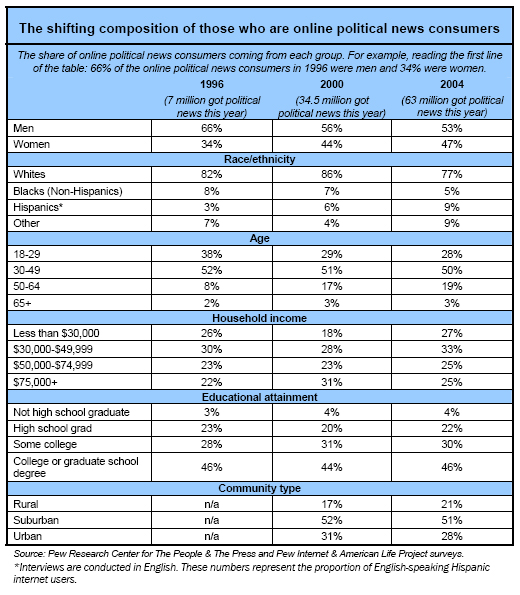
People used the internet in many ways to gather information, interact with the candidates, and chatter with fellow citizens.
Over time, the number of people using the Web and email related to politics has grown. At the same time, we have asked more questions during each election cycle about online political activities because it was clear that the number of things people were doing online related to politics was growing. The table below shows 42% growth from 2000 to 2004 in the number of people using the internet to research candidates’ issues positions; 82% growth in the number researching candidates’ voting records; 50% growth in the number taking online polls; a doubling of the number discussing politics in chat rooms and other online forums; and a doubling of those making campaign contributions online.
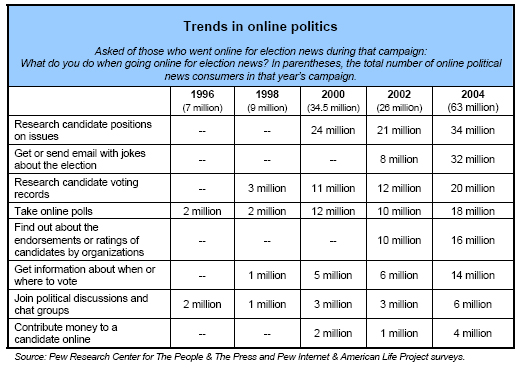
In addition, in 2004:
- 31 million went online to find out how candidates were doing in opinion polls.
- 25 million used the internet to check the accuracy of claims made by or about the candidates.
- 19 million watched video clips about the candidates or the election.
- 17 million sent emails about the campaign to groups of family members or friends as part of listservs or discussion groups.
- 14 million signed up for email newsletters or other online alerts to get the latest news about politics.
- 7 million signed up to receive email from the presidential campaigns.
- 4 million signed up online for campaign volunteer activities such as helping to organize a rally, register voters, or get people to the polls on Election Day.
Kerry voters among online political news consumers were more active online than Bush supporters, and Kerry backers claim they got more out of online politics than did Bush supporters.
More online political news consumers voted for Republican George W. Bush (53%) than voted for Democrat John Kerry (47%). However, in noteworthy ways, Kerry supporters in the internet population were more active in online politics than Bush supporters.
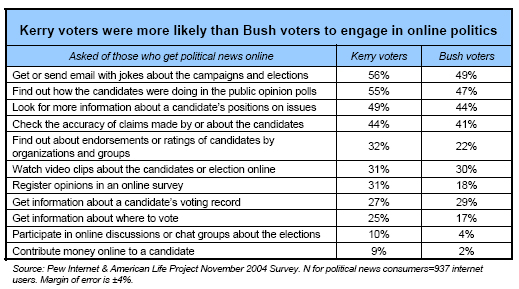
In addition, Kerry voters were more likely to use issue-oriented and political organization Web sites.
Kerry voters were more likely to say that the internet was important to them in giving them information that helped them decide their vote. Almost half of the Kerry voters (48%) who got political information online said the internet was important in providing material that helped them decide their votes, compared to 34% of Bush supporters.
The Web sites of mainstream news sources dominated the online political news environment. At the same time, alternative news sources mattered to one in four political news gatherers.
Asked where they went online most often to get news and information about the campaign, the majority of internet users reported they went to sites of traditional news organizations or online services that syndicate news from traditional sources, such a wire services. These figures have hardly changed from those reported after the 2000 presidential campaign.
- 43% of online political news consumers (those 63 million people who got campaign news and information online) said they went most often to the news sites of major news organizations such as CNN and the New York Times.
- 28% said they went most often to the news pages of online services such as AOL and Yahoo.
- 11% said they went most often to the site of a local news organization.
- 24% say they went most often to get campaign news to candidate Web sites, sites that specialize in politics, issue-oriented Web sites, government Web sites, and a smattering of other sources such as blogs or non-mainstream news sites.
People cite convenience as the main reason they get political news online. However, more than half like the internet because they say they can get information online that is not available elsewhere and because they do not get all the information they need from traditional news sources.
As the online political news consumer population has grown and come to more closely reflect the entire internet-using population, the preferences and needs of this audience have changed. In the early days of online politics, when the online audience was quite elite and highly politically engaged, online news consumers liked the internet most because it provided information from non-traditional sources. As the audience has become bigger and more mainstream, internet users’ tastes have shifted towards a preference for using the internet because it is convenient. It is still the case, though, that more than half of online political news consumers say they like getting news online because it enhances or goes beyond what they feel they get from television and newspapers.
